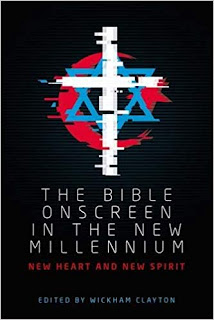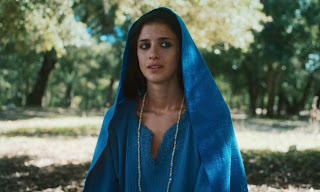Another Italian Nativity Film: Vangelo Secondo Maria (2023)
Over the years I've written about lots of Italian Bible films and quite a few Nativity films, indeed there's a special, and surprisingly large niche of Italian Nativity films, with one seeming to come along every few years most recently 2019's Il primo Natale (Once Upon a Time in Bethlehem) which went on to become that year's biggest grossing home-grown Italian movie at the box office.
Clearly, then there's a market -- in Italy at least -- for modern reworkings of the Nativity story and given the prominent role that Catholicism still has in Italian life it was only a matter of time before a new one came along. And so Sardinian director Paolo Zucca has adapted Barbara Alberti's controversial 1979 novel for Sky Cinema/Vision.
This time though it appears to be more of a dramatic re-telling than a comedy. From the looks of the trailer, and a few of the comments I have read about the film, Vangelo Secondo Maria will offer a more feminist take on the story (it came out in May in Italy) although it is naturally more conventional than Il primo's time travelling comedy.
The film stars Benedetta Porcaroli (above) as Mary, best known for the Netflix series Baby (2018-20) and the recent Sidney Sweeney nun-horror Immaculate (2024). Opposite her as Joseph will be Alessandro Gassmann (below), 33 years her senior, best known for . More pertinently, though, is the fact that he has already appeared in two other Italian Nativity films, Un bambino di nome Gesù (A Child Named Jesus, 1988) where he played the adult Jesus and Raffaele Mertes's La sacra famiglia (The Holy Family, 2006) where he also played Joseph. He had previously had a minor role in one of Mertes's other biblical TV movies Samson and Delilah (1996). So it's interesting to see him both play the father of a character he played a generation ago and to see him play the same character twice in otherwise unrelated movies. Also worth noting is Maurizio Lombardi who played Inspector Ravini so brilliantly in Netflix's recent Ripley remake.
The film's trailer came out 2 months ago and certainly gives the impression that it really wants to bring the story into the 21st century. For a start the camera work seems very contemporary with similar colour tones and lighting, and quirky camera angles, point of view shots that are more about conveying emotion than fact and some sequences that might be fantasy or might just be very outside of the typical telling of the nativity story.
Then there's the music, which may be nothing to do with the film's final soundtrack, but it certainly conveys a contemporary feel, and the fact that it's sung by a woman adds to the impression that this will be a Mary-centred retelling. Lucia Tedesco puts it so nicely "Quello a cui noi assistiamo è la storia della vita di Maria dall’unico punto di vista di cui avremmo dovuto disporre, ovvero il punto di vista di Maria"(What we are witnessing is the story of Mary's life from the only point of view we should have had, that is, Mary's). That's something that comes across in the dialogue too. Right at the start Mary says "I don't want to get married" and cries that the law is made for men not women". Later on we just hear Mary's voice cry out "I'm challenging you to answer me".
But there's more to it than that. At one point Mary says "let's pretend that instead of husband and wife you're the teacher and I'm the student" and the following shots and dialogue suggest that Joseph takes her up on that and sets about equipping her, not only teaching her more about the law but also what looks like some kind of inner-life-focused martial art. And lastly there's the shot below which physicalises Mary in the viewer's eyes, even if not in Joseph's, and seems without precedent in a historical nativity film (as far as I can remember, at least, the only Mary film that shows something even vaguely equivalent is Godard's modernisation Hail Mary (1985).
The title of the film of course seems like a nod to Italy's most famous and successful Jesus adaptation, Il Vangelo secondo Matteo (The Gospel According to Matthew, 1964) by Pier Paolo Pasolini. There wasn't anything immediately obvious from the trailer that seemed like a nod to Pasolini's film, aside from perhaps a certain fixity of the camera, but it will be interesting to see what else emerges if/when I ever get to see the final film. The other film that comes to mind is Giovanni Columbu’s Sardinian Jesus film Su Re (The King, 2012).
The more fantastical elements of the trailer certainly seem like a significant departure from both Pasolini's and Columbu's approaches to the subject, although perhaps not out of keeping with some of his other work such as Il Decamerone (1970). I suppose one key indicator of this is the brief appearance of an angel (below), shot in side profile. Pasolini's angel was played by a young woman (Rossana di Rocco) who wore a simple white dress, but here the angel is played by a young man who has wings. This is a particularly interesting detail (to me, at least) because di Rocco did appear in a later Pasolini film dressed as an gel with wings, but here the character was a human dressing up as an angel. There's a sense that for Pasolini angel's wings were theatrical
I don't want to speculate too much about the trailer. As most of the film is not there and some shots in trailers are sometimes absent from the final cut of the movie. There have been a number of reviews of the film. I won't go into them all, but a couple of things that caught my attention were as follows:
1. At one point in Sky Italia's own review they say "Tra riferimenti a Enki e Enlil, dei della mitologia mesopotamica" (between references to Enki and Enlil gods from the Mesopotamian myth). This caught my attention because I've been writing about those same myths in my work looking at Noah (Darren Aronofsky, 2014)
2. Lucia Tedesco at Lost in Cinema also mentions that not only is the film shot in Sardinia but also that bits of the dialogue are in Sardinian as well. There are also significant spoilers in her review. She has an generally positive review of the film, as does Hynerd's (Eleonora Matta)
3. Alessio Accardo at Close-up Italia mentions director of photography Simone D'arcangelo and his love of Andrei Tarkovsky, particularly Andrei Rublev. Despite the film that this film is in colour (as opposed to Rublev's black and white) I can certainly see the connection with some of Tarkovsky's other films.
I have no idea how I will get to see this film at the moment. I guess I'm hoping it will get a DVD release in time for Christmas, or at least be released to streaming.
Labels: Italian Bible Films, Italian nativity films, Nativity - Mary Joseph

















0 Comments:
Post a Comment
<< Home